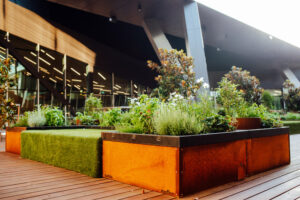Workplace urban farms, more than a food source
By Georgia Warren
Workplace farms add environmental and social amenity to office spaces, as well as economic value. Green spaces woven into and around the built form provide a sense of human scale and relationship to the broader urban form.
By growing food, workplace farms provide a range of benefits for workplaces, including improved food security and nutrition, reduced food bills, increased social connection, and opportunities for exercise and team building. They also provide a beautiful space for people to meet, connect, relax, and work together, transforming previously bare spaces into lush ecosystems that are cool, green, growing fresh food, and alive with urban biodiversity.
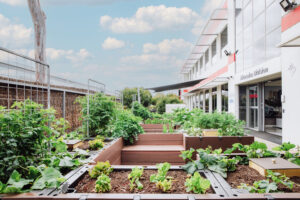
We believe that workplace farms should be more common. So, we designed and built a highly productive, compact demonstration workplace farm for the staff at our nursery. With 60 highly water-efficient Biofilta Foodcube wicking bed systems, the farm will produce around 1 tonne of fresh produce per annum, making a significant contribution to reducing food bills and improving nutrition. The farm also features a number of seating areas, gathering spaces, and shelter from the weather, allowing our work group to have meetings and breaks surrounded by a beautiful, productive urban farm.
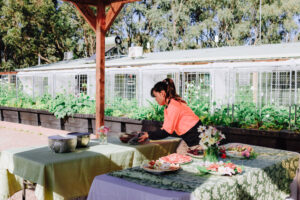
Food crops that reflect the cultural diversity of staff can be rotated through the urban farms and used in lunchtime events to celebrate, promote, and support social and cultural inclusion. Staff are encouraged to participate in the gardening activities of harvest and planting during the season. Participation in the communal garden activity increases social interaction amongst all levels of staff, and breaks barriers across different ages and backgrounds providing a safe environment for social inclusion and team building.
Staff are given the opportunity to take produce home for use in family meals or to use in onsite food preparation. Vegetables and herbs are a basic cost of living and directly impact on the household budget. Healthier employees have fewer sick days and are generally more productive. Spending time in green spaces has been shown to improve the mental health of staff, as well as any other visitors to the site.
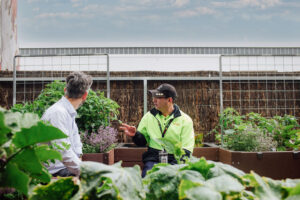
The cubes used in the workplace farm are a compact, modular, soil-based self-watering urban farming system. Manufactured using 80% food-grade recycled plastic, sourced from the food industry, they can be linked together to form large, connected urban farms that maximise water efficiency and retain nutrients for more efficient food growing in urban areas.
With 110-litre reservoirs at the base of each cube, you need only fill the reservoir once a week in summer and once a month in winter, which dramatically reduces time spent watering. Each cube also has two access points to fill up the reservoir, and when linked in series they can all be filled up from a single point. The urban farms are raised, sealed, and separate from potentially contaminated soils and groundwater. The cubes can also be recycled into other plastic products at the end of their life, contributing to the circular economy.
There are considerable water management benefits to installing food cubes on existing impervious surfaces. Hard surfaces, like concrete, create vast amounts of water runoff which on a large scale can create environmental impacts in our waterways, and on a smaller scale, can cause drainage and flooding issues in high rainfall events. By utilising rainfall as a resource, and capturing it in the cubes, water is slowed, filtered or even stopped before it reaches our waterways. By mimicking the natural water cycle and holding water in the wicking beds, a number of benefits are provided, including urban cooling, increased biodiversity, and improved mental health and wellbeing through the provision of greenery.
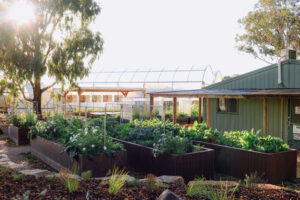
Environmental sustainability is a crucial part of many major companies’ operations and social responsibility. Having an immersive outdoor and urban farm landscape creates opportunities for staff to engage with their environment and the rhythms of nature. It also provides a setting from which to run environmental education programs.
In 2015 the member nations of the United Nations General Assembly signed up to a plan of action for people, planet, peace, and prosperity. Aiming to balance the integrated and indivisible dimensions of sustainable development – economic, social, and environmental – the plan seeks to stimulate action in areas of critical importance for humanity and the planet. The plan outlines 17 sustainable development goals (SDGs) with associated actions and targets that aim to protect the planet, end poverty, and ensure that everyone can enjoy peace and prosperity by 2030. With the world’s population recently ticking over to 8 billion it is our corporate, environmental, and social responsibility to commit to these goals urgently and action them in whatever ways we can.
Urban farming is one such action that contributes to many of the goals for sustainable development. The goals of no poverty, zero hunger, good health and wellbeing, sustainable cities and communities, responsible consumption and production, climate action, and life on the land, can all be connected to urban food production.
Urban greening and food production also contribute to biodiversity by providing habitat and food for wildlife, such as birds and insects. Creating more green spaces and food production in cities means less land outside of the city needs to be converted to farmland, slowing the loss and degradation of natural habitat.
We hope to see workplace farms become a feature of many workplaces in future.
Georgia Warren
Landscape Architect
The Sustainable Landscape Company (TSLC)
M: 0429 347 585
E: georgiaw@theslc.com.au
Main photo: Biofilta food cubes at the Melbourne Convention and Exhibition Centre (Image: TSLC)

